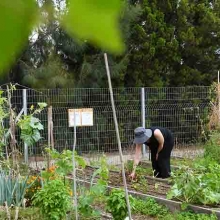Prof. Asaph Aharoni is the first André Deloro Prize winner
Winner of the new André Deloro Prize
People behind the science

The winner of the new André Deloro Prize is Prof. Asaph Aharoni, whose work in plant metabolomics - the study of the chemical fingerprints in cellular processes—is ushering in new insights in plant biology and creating new possibilities for plant-based materials.
The Deloro Prize, funded by the Adelis Foundation of France, will be awarded by the Weizmann Institute every year to a scientist doing particularly exceptional work in his or her field.
The Adelis Foundation is a longtime Weizmann Institute partner, contributing most recently to the launch of the André Deloro Building which will house research facilities for the exploration and invention of new materials.
Prof. Aharoni, of the Institute’s Department of Plant and Environmental Sciences, has developed a suite of next-generation computational and experimental biology tools for the identification and characterization of metabolites—small molecules that are part of the network of metabolic pathways in plants. These tools increase the amount of useful data that can be derived from mass spectrometry, a technology in which the separation and fragmentation of gaseous ions are used to identify a substance’s chemical makeup.
With the help of these new tools, Prof. Aharoni has been able to amass a library of data that reflects the molecular structure of various metabolites according to very exact analytic criteria. The suite’s superior functionality also reveals a detailed picture of what goes on inside plants, from lipid dynamics, to the movement of metabolites through a plant over time. One capability of the tool suite - which Prof. Aharoni calls Metabolite Spatial Imaging, or MSI - makes it possible to track metabolites in intact plants, rather than examining the chemical nature of crushed samples.
method developed by his lab allows him to isolate to high purity plant organelles and examine them for their metabolite profiles, revealing a more exact model of processes occurring inside plants as they grow.
Prof. Aharoni’s findings are as wide-ranging as the tools he has created. His recent publications include new data about the regulation of plant biosynthesis; the bacterial content of underground soil; and even an unprecedented way of bio-engineering plants to generate L-DOPA, the leading drug for the treatment of Parkinson’s disease.
Prof. Aharoni is a senior member of AERI, the Institute’s Alternative and Sustainable Energy Research Initiative; the late André Deloro was a proponent of alternative energy solutions.
“One of society’s biggest challenges is solving the energy puzzle, and part of the answer will come from identifying particular plants as outstanding raw material for biofuel,” Prof. Aharoni says. “Our lab’s technical infrastructure - which is unique in Israel - allows us to analyze the plant-based lipids and carbohydrates that determine biofuel’s green power potential. Using a combination of analytical chemistry, plant molecular genetics, and computational biology, our work is expanding the categories of biomass available for biofuel production. What’s more, we are looking at ways to optimizing the production of biofuel as a source of alternative energy capable of challenging fossil fuels in the global marketplace.”
Prof. Aharoni is supported by the Tom and Sondra Rykoff Family Foundation, the Leona M. and Harry B. Helmsley Charitable Trust, the Lerner Family Plant Science Research Fund, and Yossie and Dana Hollander, Israel. He is the recipient of the André Deloro Prize and is the incumbent of the Peter J. Cohn Professorial Chair.








